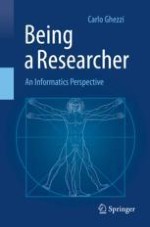2020 | OriginalPaper | Buchkapitel
2. Research Methodology
verfasst von : Carlo Ghezzi
Erschienen in: Being a Researcher
Aktivieren Sie unsere intelligente Suche, um passende Fachinhalte oder Patente zu finden.
Wählen Sie Textabschnitte aus um mit Künstlicher Intelligenz passenden Patente zu finden. powered by
Markieren Sie Textabschnitte, um KI-gestützt weitere passende Inhalte zu finden. powered by
